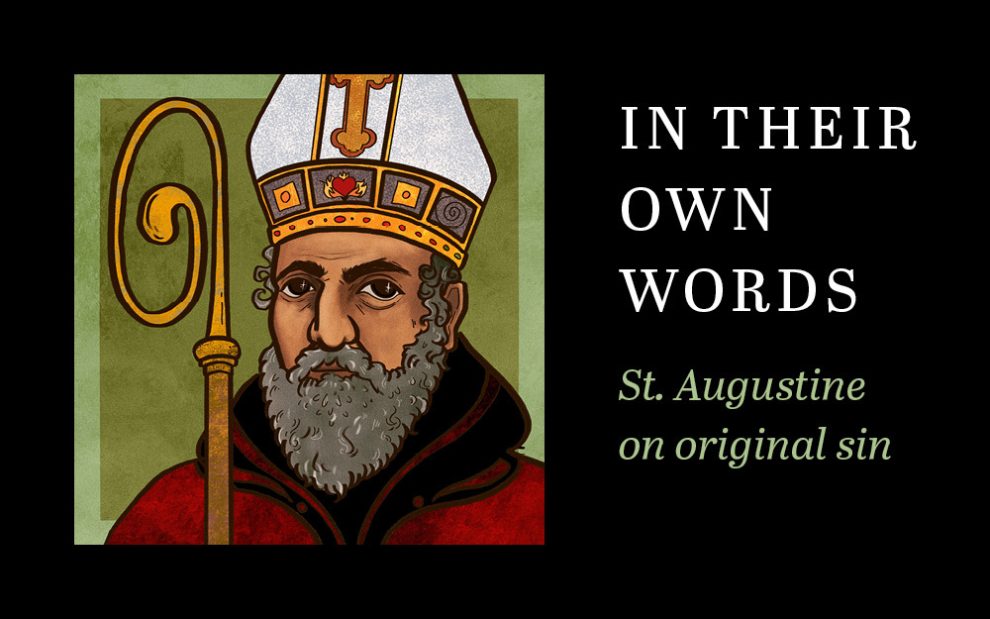Introducing In Their Own Words, a new web column from U.S. Catholic. In these essays, academics and other experts provide short, evidence-based explanations of prominent Catholic figures’ views on an array of topics of interest to the church and offer resources for finding further accurate information.
To appreciate Augustine on original sin, it is helpful to start with his view of humanity—and, as always when writing about Augustine, I begin with the caveat that his thought is wide-ranging and complex, and there is more than one way to understand his theology. Still, it is fundamental to Augustine’s thought that all things are created out of nothing, and—since they are generated by goodness itself—all things are innately good, including human beings.
Contrary to the “total depravity” view often linked to him, Augustine actually holds that everything that exists is good. He does claim, in On the Grace of Christ and on Original Sin. that “through the sin of the first man, which came from his free will, our nature became corrupted and ruined; and nothing but God’s grace alone, through Him who is the Mediator between God and men, and our Almighty Physician, succours it.” But here it is the will that turns us away from being itself (i.e. God) and turns us back toward ourselves and the nothingness that we came from. We ourselves are good.
As Augustine writes in City of God, “We are made in the image of God and “linked together by a common fellowship based on a common nature” that is grounded in our capacity for virtue infused by wisdom (read: Christ), as well as in our weakness and capacity to turn from the good. And in On Christian Doctrine, he writes that “Wisdom condescended to adapt [itself] to our weakness, and to show us a pattern of holy life in the form of our own humanity.” Our very humanity is tied to Christ’s humility. Augustine recognizes that our essential human-ness comes from embracing our interconnection with all of creation in Christ. In Augustine’s account of the fall, then, we see two related, if distinct, attributes of sin—both of which subvert this humble interconnectedness.
The first is the willingness to be deceived, which he attributes to Eve: “the woman accepted as true what the serpent told her,” Augustine laments in City of God. In Genesis 3, Eve tells the serpent that God said of one tree in the garden, “You shall not eat it or even touch it, or else you will die.” The snake replies, “You certainly will not die! God knows well that when you eat of it your eyes will be opened and you will be like gods, who know good and evil.” In City of God, Augustine theorizes that, in a sudden desire to experience what is beyond human limits, Eve succumbs to the serpent’s seductive influence, no longer “[judging] that which [she did] to be sin.”
The second aspect of sin is a misplaced longing for community. Augustine suggests that Adam was not deceived—as a man (the “more rational” being, according to the sexist prejudices of the time) he could supposedly withstand the seduction of the serpent. But Augustine suggests that Adam “could not bear to be severed from his only companion, even though this involved a partnership in sin.” So he too ate the apple. When forced to choose between honoring God’s command but losing his beloved, or accompanying Eve into corruption, Adam, in his desire for communion, undermined the very reality that could sustain it.
Adam and Eve make excuses for their actions. Augustine tells us that this pride, this failure to own up to their free choice, is worse than the initial sin itself. And he blames pride for the initial action, too: “What is the origin of our evil will but pride? For pride is the beginning of sin,” he writes, in City of God.
Pride looms large in Augustine’s account of original sin because it is so easily integrated into the human condition: It reflects the immortality of the human soul, limited by its physical embodiment. In other words, we have finite capacity but infinite love; we cannot express the fullness of our love to everything, everywhere, immediately, even if we want to. Augustine thinks, that we humans, in trying to negotiate this tension, exceed our limitations in pursuit of the things we love. This overreach, for Augustine, is pride.
The things we love and desire are not ours to hold. Love turns false and dangerous when we assert ourselves as the masters of our universe. Our original sin, in Augustine’s view, is the human condition that reaches for the illusion of power or community but ultimately turns us inward until we annihilate ourselves—rather than turning us outward, toward the eternal horizon of God’s love.
Original sin gets passed down to all human beings primarily through sex. Augustine has a negative view of sex, associating it with both carnal lust (which he calls concupiscence), and separation from God (presumably since he loses rational cognition during orgasm, and so cannot contemplate the divine). A child created through this act must be tainted, he argues, with these human limitations and desires.
But Augustine also recognizes that sin is calcified in unjust social structures. By denying our humanity—the “true self” made in the image of God, which is the humility of Christ—and adopting structures of dominance rather than interconnection, humans failed to stanch “the flow of habit, by which [we are] wasting away to death,” he writes, in Confessions. The choice to turn from goodness becomes easier the longer we are habituated to it.
Because the early church drew on his ideas to grapple with the tensions of being human, Augustine’s insistence on both the goodness of humanity and the pervasiveness of original sin shaped Catholic doctrine centuries ago, and his views remain influential today, as well.














Add comment